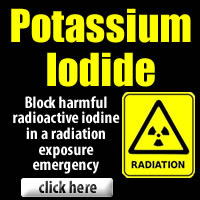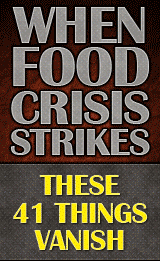George Ure and Gaye Levy, Contributors
Activist Post
We are not suggesting it will happen, but suppose in March something goes terribly wrong and there is a major terrorist attack in a big city. If this happened, there would be a tremendous ripple effect going forward in time for the entire country. Perhaps because of a recent death (Whitney) but one such city comes to mind: Houston.
The Nightmare Scenario
Let us imagine a national nightmare moment. One of our nuclear weapons is missing from the national inventory. (And don’t kid yourself: there could be hundreds missing worldwide. Some left over from the Cold War like the one-man munitions, and others from things like improperly secured Russian MIRV warheads. Remember the movie “The Peacemaker”?) Let us further suppose that America’s enemies are smart enough to be able to read maps and that they notice that there is quite a concentration of oil refineries in the Houston area. And not just with the Houston/Baytown capacity, but also downwind 70 miles in Port Arthur and Beaumont where there would likely be fallout from a nuclear device. And, finally, just suppose that forces which want to destroy America have set off such a device in the Houston area. When that happens, our key energy refinery center is destroyed.
Now we do not think such a predicable plot alone would be allowed by the Powers That Be, although certain rituals such as a halftime event, and the death of a major pop star, would certainly press speculation in the illuminist’s direction (fool us once). But to get back on track, our point today is to consider what happens to knowledge if and when such a dastardly deed is done.
Yes, it would be awful. But yes, America would eventually recuperate. But getting through the period that would follow such a nightmarish event most assuredly would not not be fun for anyone. To begin with, some of that refined Texas product is diesel which goes up the Mississippi and fuels America’s breadbasket. Other products go through distribution pipelines which take product north – sometimes as diesel and other times as gasoline, jet fuel, or whatever the cracking mix of the season might be.
Except this one.
Besides the nuclear fallout, there would be huge lifestyle fallout. That’s right: a Lifestyle Fallout. Consider this: A check of LaPorte Municipal, with its dual runways and a check of meteorological reports suggests that an east-to-west wind is possible this time of year; so an attack on Port Arthur or Beaumont could send debris and fallout over Houston.
Can you imagine the disruption? Regional telephone, energy, and shipping suddenly unworkable at what would be a heavy time of year getting product up north?
If an unlikely event of this type were to occur, there are lots of strategic angles to launch off on, but the one which is front and center on our table today is sorting out what kind of “portable knowledge” you’d want to have around to pass on to the kids and to share with fellow survivors.
Being the industrious sort, we started looking into this since the lifestyle fallout and portable knowledge issue is part and parcel of getting very serious about our prepping. Gaye in Washington State, and George in Eastern Texas – makes no matter since the concept of a coming “game-changer” seems foremost in our thoughts. That, plus the fact we are both downwind for some major refineries.
So with the game-changer mentality circling the Net, there comes a boom in the sale of all kinds of prepping goods. This includes stored foods, water filters, firearms and all the rest.
The Black Hole of Knowledge
 What we’re not too sure of is the matter of post-“whatever” knowledge engineering. And while we appreciate that it is hard to imagine the worst of worst-cases, it seems to us that a limited number of books, no more than a half-dozen or so, should be selected to ensure that if (when?) the grid goes down, you will at least have books in hand which solve the “portable knowledge” problem.
What we’re not too sure of is the matter of post-“whatever” knowledge engineering. And while we appreciate that it is hard to imagine the worst of worst-cases, it seems to us that a limited number of books, no more than a half-dozen or so, should be selected to ensure that if (when?) the grid goes down, you will at least have books in hand which solve the “portable knowledge” problem.
Why? Because in a post-disaster world, there is not likely to be any Internet access, nor might there be supplies of this and that from China and India, where a huge fraction of American consumer goods come from. We will be on our own and will need to make do with what we have in our brains and on our shelves.
So let’s pick out some books.
Four Books and One Freebie
Our first pick is the Thomas Glover and Richard Young’s book Desk Ref (hardcover, $27) which although 1,268 pages in length, is a tremendous resource. Oh, sure, the section on first-aid is not there, nor are recipes for building nuclear shelters, or when to plant crops. Those kinds of things are missing. On the other hand, drafting symbols, chemical details, basic electronics including color codes for components and so forth, are there in abundance.
The second most important book would be an EMT training book like the ($82) paperback version of Emergency Care (edition or later) because it will at least give you a fighting chance at keeping someone alive.
If you don’t have the latest in EMT training, at least be aware that as of 2010, the American Heart Association’s cardiopulmonary steps were rearranged from A-B-C (airway, breathing, chest compression) to C-A-B (chest compressions, airway, breathing). You can find the latest version here for free.
The next piece of pass-on learning would no doubt involve food. It is hard to beat something like John Jeavon’s How to Grow More Vegetables or, for smaller areas, Gaye’s favorite: Mel Bartholomew’s All New Square Foot Gardening.
You will notice that we’ve moved any concern about radiation way down our list of books, but somewhere in your travels, a copy of Cresson Kearney’s classic Nuclear War Survival Skills handles the lowdown on everything from improvised clothing and protection to how to arrange logs to withstand a 53-pound over-pressure blast zone.
By the way, humans can handle about 5 pounds of overpressure. That is when eardrums break and there is other long-lasting damage (such as death). The main numbers are 2 PSIm which is like getting hit with an instant 70 MPH wind, while 5 PSI overpressure is like walking into a 163-mile-an-hour wind. No fooling – you would probably get hurt.
Four books. Not an altogether bad little collection. With these four books you get tons of information. They are not excessively bulky and are mostly readable. But are there some other books which maybe have served previous generations?
Additional Books for Extra Credit
Now we have to sit back and do a little visioning of the world in the future. Will there be a shortage of food? If so, then we’d want to have a copy of The Forager’s Harvest, except that won’t get us around problems like our (hypothetical) chemical or nuclear disaster down in Houston. We know food will be at a premium if terror ever struck there, however, so this one is a must-read.
Fed, watered, well-read, what’s the next problem? People will hate you, so toss both the SAS Survival Handbook and the companion SAS Urban Survival Handbook (no relation to George’s Urban Survival, but thanks for asking. He actually coined the term in 1997 FYI).
 For getting around, we might add the The SAS Guide to Tracking, and, next to that, the more digestible Finding Your Way Without Map or Compass.
For getting around, we might add the The SAS Guide to Tracking, and, next to that, the more digestible Finding Your Way Without Map or Compass.
Given something bad happening, or even on a bad weekend in the Big City, these books would really help someone get along. But what if something really off-the-wall and not covered in other prepping books pops up?
Oh, you mean like getting control of a runaway hot air balloon? Or how to survive a 16-car freeway accident when everyone is freaking out? Got just the ticket here: The Worst-Case Scenario Survival Handbook: Extreme Edition. Now, we hope you never have to use the “how to take a bullet” advice, or how to endure a Turkish prison, but such things do make for interesting and amusing reading.
Cripes, these books are breaking my back!
With a pretty solid little library, it is going to start to get a little heavy to carry your portable knowledge long distances – especially if it boils down to a choice between water and food (our pun writers are working overtime) or knowledge. What we now have to figure out is how to put this knowledge somewhere so we can come back to it later on and share it, if we are so inclined.
Ideally, before nuclear war, false flags, or whatever other nefarious event breaks out, we think it would be convenient to have a lot of this knowledge on hand. That way some of it will be carried around in our heads instead of on our person.
This is especially true as it relates to your health and the medicines you take. For example, if have asthma and use Qvar, and don’t know that it’s actually “beclometasone dipropionate”, then you need to get hitting the books. Information like the name of prescription drugs, along with memorizing the top drug interactions with your meds is about the most basic kind of information critical to staying alive that there is.
Here’s the problem that our “winking out” scenario poses: Right now, the handy pharmacy dude/dudette/babe/or stud down at the Wal-Mart or Walgreen’s runs a computer check of your meds with all the dangerous combinations, and when they come in, they give you review of the risks. They even make you sign a paper saying you “get it” and everyone’s doctors and lawyers are happy.
Now, what happens if there is NO internet and NO cloud and all those survival eBooks you had been collecting just bit the dust? If they are your on computer they are toast, since printers and all other electronic devices have an ugly dependency on electricity. When you think about it, sure, there are lots of books which fit well onto the new Kindle Fire and are perfectly suitable for modern times . . . when the power is on.
But let us not forget that in the old days (five years ago) books, not computers and not gizmos, were where people gleaned their knowledge. Turn off the power, turn off the food supply, turn off the lights, have people walking off the job because they are not getting paid — and suddenly books, pencils, pens, paper, and all those old-fashioned things (physical calendars, astronomical books, old farmerly stuff) begin to make sense. Yep, all of it.
So where does this discussion lead? Down to a couple of simple questions:
- Do you have a go-forward plan to preserve critical knowledge and be able to pass it on to another human should you be incapacitated?
- Is your collection of portable knowledge something you could put in a Tupperware box with a couple of garbage bags around it, and bury it three feet deep so you could come back and get it later?
- If you emptied your pockets right now would you have:
-A pocket knife?
-A flashlight?
-A lighter or flint & steel?
-A paracord bracelet on your arm?
Each of these things is a marvelous if not downright amazing survival tool in the right hands. But are those your hands, or someone else’s hands?
 Getting Back to the Portable Knowledge
Getting Back to the Portable Knowledge
If you know how to read, you can learn how to become a much more competent human being. Sure, if you’re within the fireball area of a 1 MT blast, you’re a goner. But 80 miles away?
You may have a lot of reading time on your hands, because there won’t be any television; the sources of food and water will be sketchy . . . and on goes the list.
Worse than a 1MT bomb? A derivatives blow-up could do almost the same thing, minus the fallout.
We live in a period where prepping – which we’ve been talking and writing about – has suddenly become mainstream. And with the odds of a major dust-up in the Middle East, we hear that Geiger counter sales have gone up 30% in the past two months. Clearly, we do not see the need for prepping to diminish any time soon.
If you don’t have the means to “get around the country” unimpeded, it’s past time to get a set of hiking boots and commit a whole lot of information to memory. Then figure out which one, or two, of your survival books will do you the most good on the trail. Or, worst case, figure out in advance which pages from which books you will want with you. Foraging, first aid, radiation, engineering water flows, pulleys – just what is it that you want in your portable knowledge cache?
And remember: If it has a battery, it’s already gone and the knowledge will have to be learned once again through another cycle of humans. Take this with a big sign and an even bigger “oh well”.
This might be a good time for a quick refresher course on what the immediate impacts of nuclear weapons are, of the sort speculated as being in the wings for the Middle East. Need we mention that global escalation is one of the possible outcomes? And though we reference Houston, an attack could happen anywhere.
Out crystal ball is telling us it is time to build a portable library of knowledge.
Hang on and enjoy the ride,
Introducing Strategic-Living: a practical and useful online magazine providing inspiration and guidance as we make our way through the maze of changes that are coming our way. In collaboration with my friend and colleague, George Ure, Strategic-Living will offer a synthesis of Urban Survival and Backdoor Survival with much more detailed tips, tools and strategies for creating a vibrant and sustainable lifestyle wherever your path may take you. Think of Urban Survival and Backdoor Survival as your roadmap and Strategic-Living as your detailed guidebook. Here you will find articles and photos, diagrams and how-to’s, and a healthy dose get-out-there and do it with kick-in-the-ass inspiration.
linkwithin_text=’Related Articles:’



Be the first to comment on "Essential Survival Books for Solving the Portable Knowledge Problem in a Post-Disaster World"